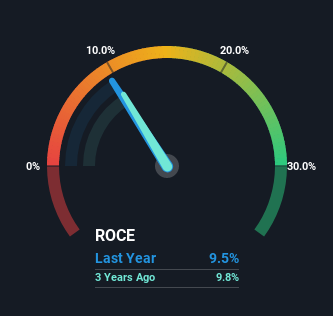Isgec Heavy Engineering (NSE:ISGEC) Will Want To Turn Around Its Return Trends
If we want to find a potential multi-bagger, often there are underlying trends that can provide clues. Firstly, we'll want to see a proven return on capital employed (ROCE) that is increasing, and secondly, an expanding base of capital employed. Put simply, these types of businesses are compounding machines, meaning they are continually reinvesting their earnings at ever-higher rates of return. In light of that, when we looked at Isgec Heavy Engineering (NSE:ISGEC) and its ROCE trend, we weren't exactly thrilled.
Understanding Return On Capital Employed (ROCE)
Just to clarify if you're unsure, ROCE is a metric for evaluating how much pre-tax income (in percentage terms) a company earns on the capital invested in its business. Analysts use this formula to calculate it for Isgec Heavy Engineering:
Return on Capital Employed = Earnings Before Interest and Tax (EBIT) ÷ (Total Assets - Current Liabilities)
0.095 = ₹2.8b ÷ (₹66b - ₹37b) (Based on the trailing twelve months to September 2022).
Therefore, Isgec Heavy Engineering has an ROCE of 9.5%. Ultimately, that's a low return and it under-performs the Machinery industry average of 16%.
See our latest analysis for Isgec Heavy Engineering

Historical performance is a great place to start when researching a stock so above you can see the gauge for Isgec Heavy Engineering's ROCE against it's prior returns. If you're interested in investigating Isgec Heavy Engineering's past further, check out this free graph of past earnings, revenue and cash flow.
What Can We Tell From Isgec Heavy Engineering's ROCE Trend?
On the surface, the trend of ROCE at Isgec Heavy Engineering doesn't inspire confidence. Around five years ago the returns on capital were 16%, but since then they've fallen to 9.5%. Meanwhile, the business is utilizing more capital but this hasn't moved the needle much in terms of sales in the past 12 months, so this could reflect longer term investments. It may take some time before the company starts to see any change in earnings from these investments.
On a separate but related note, it's important to know that Isgec Heavy Engineering has a current liabilities to total assets ratio of 56%, which we'd consider pretty high. This can bring about some risks because the company is basically operating with a rather large reliance on its suppliers or other sorts of short-term creditors. While it's not necessarily a bad thing, it can be beneficial if this ratio is lower.
In Conclusion...
In summary, Isgec Heavy Engineering is reinvesting funds back into the business for growth but unfortunately it looks like sales haven't increased much just yet. And investors appear hesitant that the trends will pick up because the stock has fallen 15% in the last year. Therefore based on the analysis done in this article, we don't think Isgec Heavy Engineering has the makings of a multi-bagger.
If you want to know some of the risks facing Isgec Heavy Engineering we've found 3 warning signs (2 shouldn't be ignored!) that you should be aware of before investing here.
While Isgec Heavy Engineering may not currently earn the highest returns, we've compiled a list of companies that currently earn more than 25% return on equity. Check out this free list here.
New: AI Stock Screener & Alerts
Our new AI Stock Screener scans the market every day to uncover opportunities.
• Dividend Powerhouses (3%+ Yield)
• Undervalued Small Caps with Insider Buying
• High growth Tech and AI Companies
Or build your own from over 50 metrics.
Have feedback on this article? Concerned about the content? Get in touch with us directly. Alternatively, email editorial-team (at) simplywallst.com.
This article by Simply Wall St is general in nature. We provide commentary based on historical data and analyst forecasts only using an unbiased methodology and our articles are not intended to be financial advice. It does not constitute a recommendation to buy or sell any stock, and does not take account of your objectives, or your financial situation. We aim to bring you long-term focused analysis driven by fundamental data. Note that our analysis may not factor in the latest price-sensitive company announcements or qualitative material. Simply Wall St has no position in any stocks mentioned.
About NSEI:ISGEC
Solid track record with excellent balance sheet.
Similar Companies
Market Insights
Community Narratives




